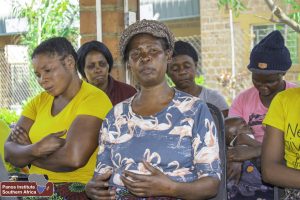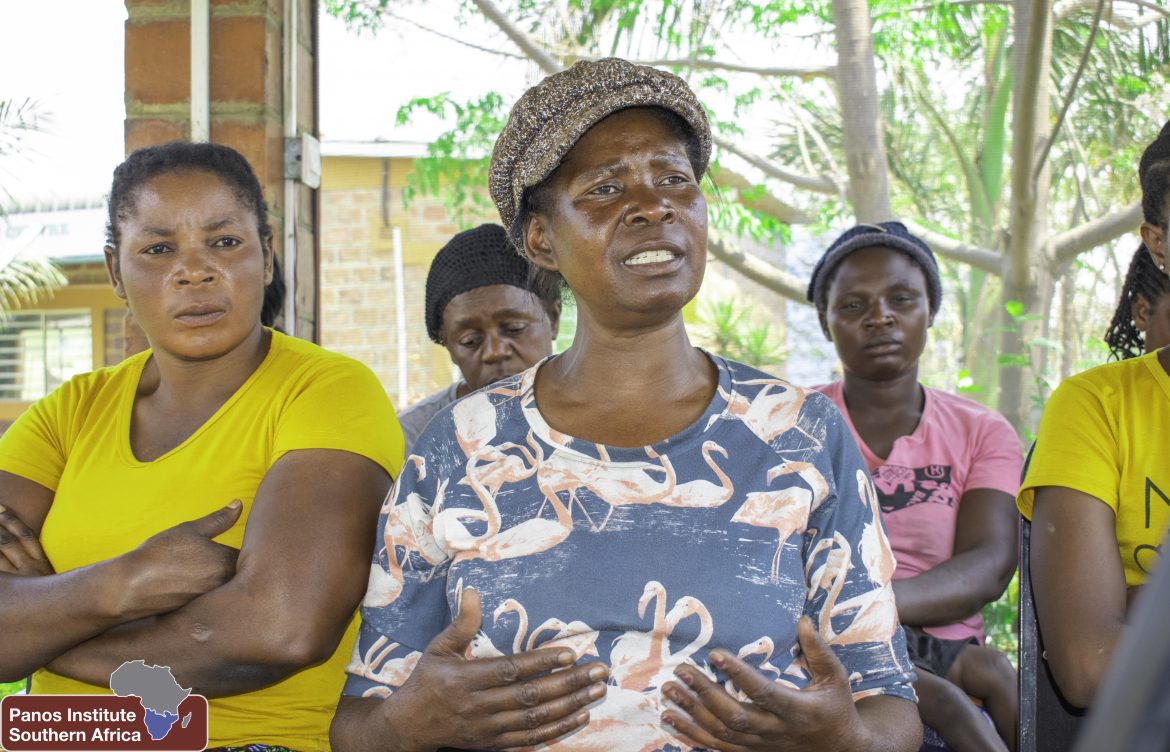
Discussion between Panos and the Federation at Kanyama Green Innovation Centre.
Kanyama Women’s Federation regional leader, Ms Alice Phiri explained that the women’s group has been involved with the VCA programme for over two years and shared the positive change the programme was making for the members.
Before the introduction of VCA programs in our community, most of us had nothing to do to address many challenges in our families such as lack of food and clothing. Even gender-based violence cases among couples in our community were high because women depended on their spouses to provide for them and their families, failure to which misunderstandings arose – Alice Phiri
EXPANDING
Alice Phiri is happy that the Federation, which started with only 35 members, has now grown to about 365 members, including those living with disabilities. Members have been divided into various sizeable groups to ensure effective management of the large group and its activities.

Federation members demonstrate the making of organic manure.
Ms Phiri shares that the Federation members are elated to be involved in co-creating climate solutions through locally-led climate solutions such as organic manure making, biogas and liquid fertiliser production.

A Federation member shares how they are using organic manure to grow vegetables.
The group is also engaged in the growing of vegetables which they sell to the community for income. Ms. Phiri shares that these activities are now sustaining their families in various ways including provision of school requisites for their children and food for their families.
Any superimposed false climate solution is a wasteful allocation of resources, as it is likely to fail – Alice Phiri
The activities of the Kanyama Women’s Federation bear testimony to the fact that the vulnerable, particularly women, can play a bigger role in the fight against climate impacts and poverty through eco-friendly practices once they are provided with the required knowledge and skills.

Vegetables are grown by the Federation using organic manure through sack gardening.
Ms Phiri encourages other women in the country to seize such opportunities and join hands to uplift their economic well-being and reduce poverty in their homes.

Federation members share the challenges, opportunities and learning experiences with the Panos Institute Southern Africa visiting team.
CHALLENGES AND OPPORTUNITIES
Despite their significant contributions, women continue to face unique challenges in the fight against climate change. Gender inequalities, limited access to resources, and cultural norms limit their full involvement in climate initiatives. However, recognising and addressing these challenges presents an opportunity to unleash the full potential of women’s leadership in climate solutions.

The Federation and Panos pose for a group photo at the Green Innovation Centre.
Women are undeniably at the forefront of locally-led climate solutions, shaping the future of our planet in profound ways. Their leadership, resilience, and innovative approaches offer hope and inspiration in the face of climate change. To harness their full potential, there is a need to commit to gender equality, inclusivity, and empowerment, recognising that women’s contributions are indispensable in the global effort to combat climate change and build a more sustainable world.







